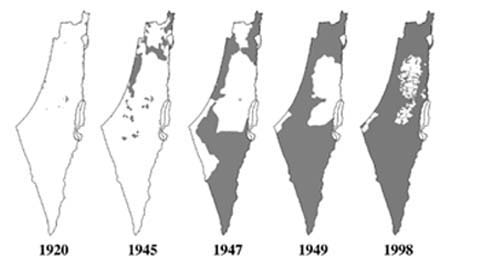As Israelis celebrate the foundation of their state, Palestinians mark what they consider the darkest day in their history – Nakba Day. It commemorates the displacement and dispossession of hundreds of thousands of Palestinians from their homeland in 1948; they mourn the loss of their homes, lands, and way of life.
The story of the Nakba is complicated, with multiple main events that caused the Palestinian nation’s greatest tragedy.
Early Immigration
The roots of the Palestinian tragedy extend back to the early 20th century when waves of Jewish immigrants began arriving in Palestine, encouraged by the Zionist movement’s aspirations for a Jewish homeland.
By the 1930s, the Jewish population in Palestine had increased significantly, facilitated by British colonial policies favoring Jewish immigration over the indigenous Palestinian population.
Palestinian Revolt
In the 1930s, Palestinians rose up against British colonial rule and the increasing influx of Jewish immigrants. The Great Arab Revolt of 1936-1939 saw widespread Palestinian resistance to British policies and Zionist settlement, leading to a violent suppression by British forces.
This period marked the emergence of Jewish armed groups, including the Haganah, Irgun, and Lehi, which later played a pivotal role in the events of 1948.
International Resolution
The UN partition plan of 1947 allocated disproportionately less land to Palestinians, who constituted approximately two-thirds of the population but were assigned only 43% of historic Palestine.
In contrast, Jewish settlers, comprising one-third of the population, were granted 56% of the land. Arab rejection of this plan, seen as unjust, set the stage for the 1948 war.
The War
The 1948 Arab-Israeli War, also known as the War of Independence from the Israeli perspective, was a watershed moment in Palestinian history.
Jewish armed groups, including the Haganah, Irgun, and Lehi, launched coordinated military campaigns aimed at securing territory and driving out the indigenous Palestinian population.
Mass expulsions, massacres, and the destruction of Palestinian villages were widespread, while small armies from multiple neighboring Arab countries, including Egypt, Jordan & Saudi Arabia, tried to intervene; the absence of leadership resulted in their ultimate defeat, and as those armies retreated they unfolded a bigger catastrophe.
The Nakba (Catastrophe)
The Nakba resulted in the forced displacement of approximately 750,000 Palestinians, representing more than half of the Palestinian Arab population at the time. Many fled to neighboring countries such as Jordan, Syria, and Lebanon, seeking refuge from the violence and persecution.
The United Nations Relief and Works Agency for Palestine Refugees in the Near East (UNRWA) was established to provide humanitarian assistance to Palestinian refugees, whose numbers have since swelled to over 5 million across the Middle East.
Palestinian Diaspora
Despite the trauma of displacement, Palestinian communities in Jordan, Syria, and Lebanon have persisted, maintaining their cultural identity and heritage.
In Jordan, Palestinian refugees constitute a significant portion of the population, with estimates ranging from 30% to 70%. In Syria, Palestinian refugee camps, such as Yarmouk, have been at the center of the country’s conflict, facing violence and displacement once again.
In Lebanon, Palestinian refugees continue to face legal and social discrimination, with limited access to employment, education, and healthcare.
Throughout the diaspora, Palestinian-origin figures have risen to prominence in various fields, including academia, literature, arts, and politics.
Renowned figures such as Edward Said, Ghassan Kanafani, Bella Hadid, and Hanan Ashrawi have amplified the Palestinian voice on the international stage, advocating for justice, equality, and the right of return for Palestinian refugees.
As Nakba Day commemorates its 76th anniversary, it serves as a solemn reminder of the ongoing Palestinian struggle for justice, dignity, and the right to return to their homeland.
Despite decades of displacement and dispossession, the Palestinian people remain steadfast in their resilience and determination to achieve freedom. As the world reflects on the events of 1948 and its enduring legacy, it must acknowledge the Palestinian narrative and work toward a just and equitable resolution to the Israeli-Palestinian war.
WE SAID THIS: Don’t Miss…Hope Shattered: Israeli Settlers Vandalize Humanitarian Aid Convoy To Gaza



